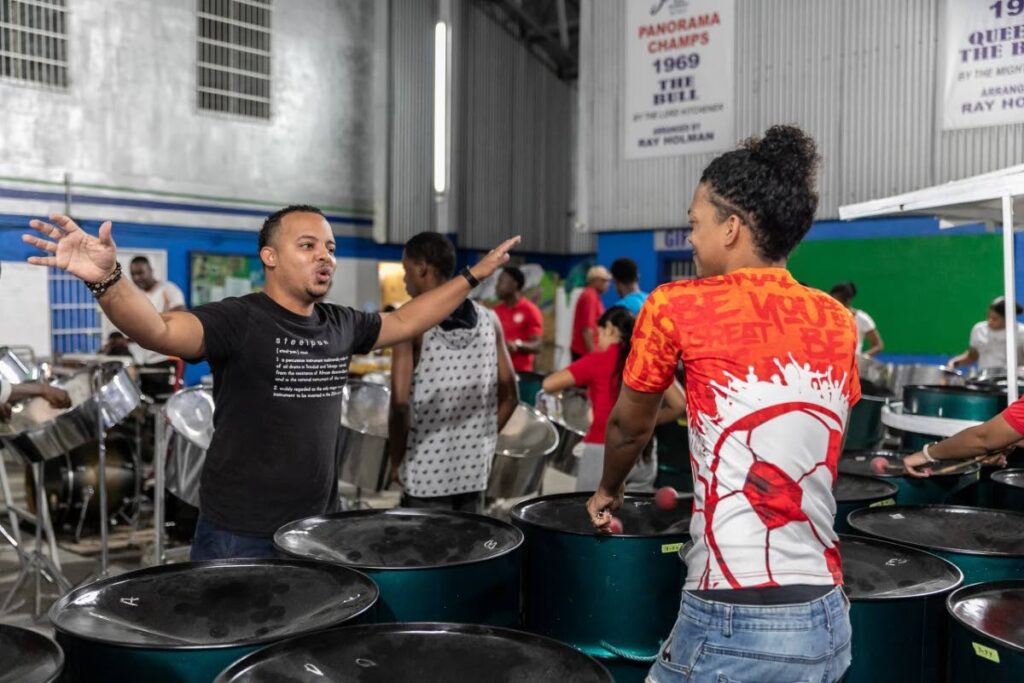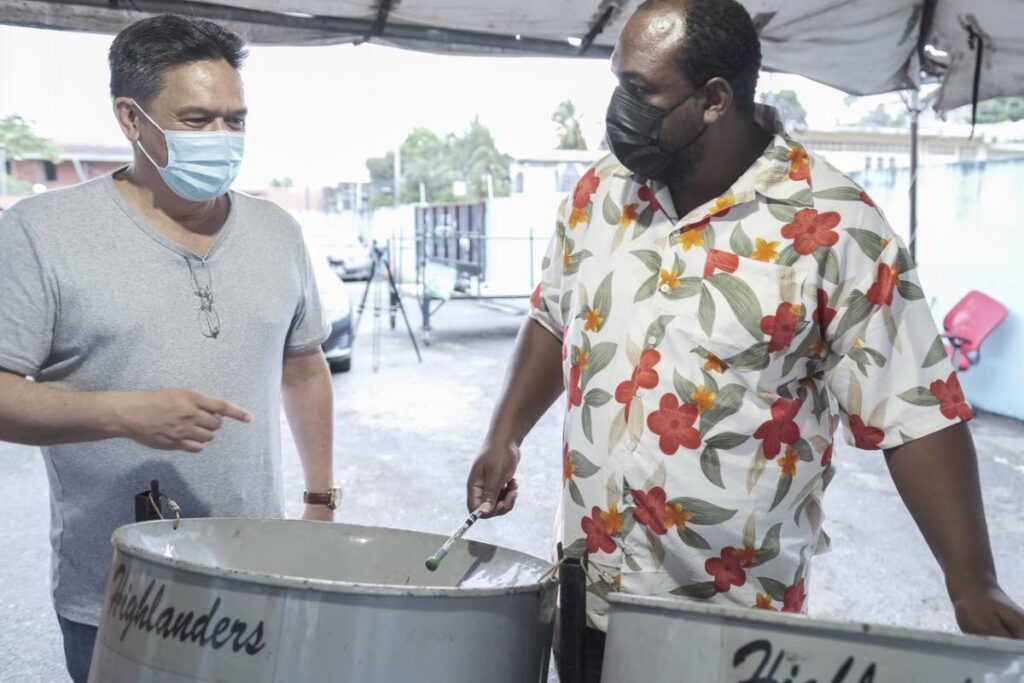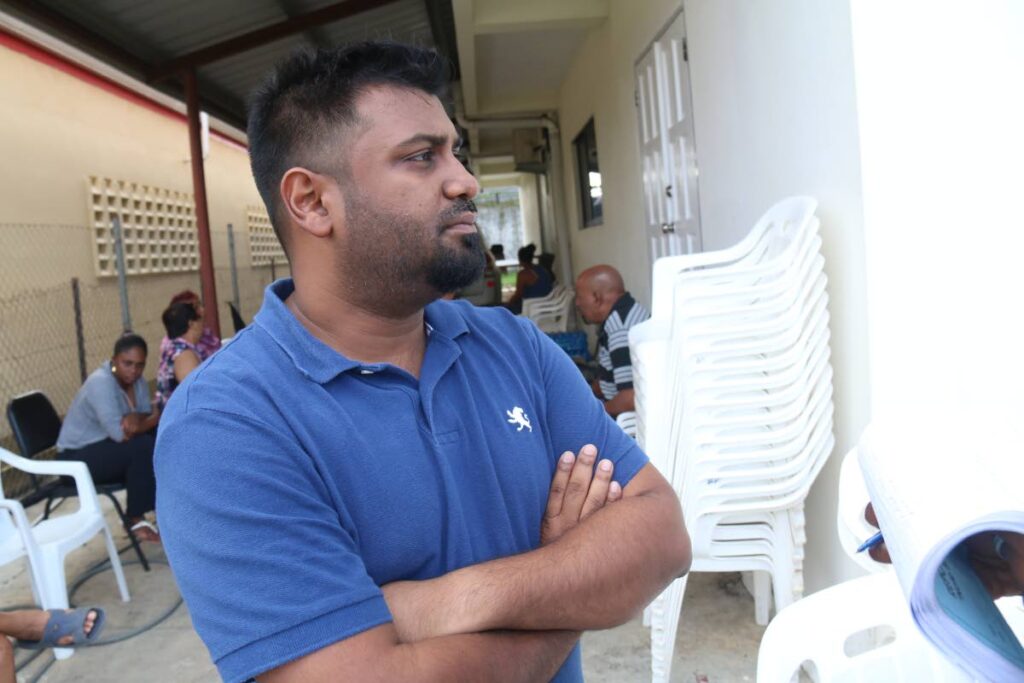Pan melodies unite hearts globally

BAVINA SOOKDEO
The mesmerising music of the pan resonate like those of no other instrument. In Trinidad and Tobago its unique sound evokes a sense of unity and cultural pride that is unparalleled. As this captivating art form continues to thrive, hopes for its expansion soar high, both locally and across the world.
Innovative applications of the pan have extended beyond the confines of the National Panorama competition.
Playwright and director Victor Edwards has masterfully woven pan melodies into theatrical productions such as Eric: The Musical, and A Brighter Sun, based on Sam Selvon's novel. Edwards said, “Our theatre is local and West Indian that moves between sensibilities...so the East Indian plays would have that strain, and the others, because of their context, would have the pan and other known instruments.”
Considering the international reach of pan, Edwards said, “Pan is all over the world...I think the UN’s recognition of World Steelpan Day is great and it should act as a catalyst for worldwide recognition. Hopefully we at home will move with alacrity to preserve its origins...things have a way of getting lost.”
Surujdeo Mangaroo, executive producer of NeeLeeJi Entertainment Ltd, highlights the inclusion of pan in its programming. Notably, NeeLeeJi has incorporated the national instrument into various events, including the Independence Local Classical Song Competition. Mangaroo says this integration will continue, including in this year’s Hindi film song competition, Sangeet Pradarshan, co-produced by the Hindi Foundation of T&T Inc and NeeLeeJi.
As industry luminaries and passionate supporters weigh in on the international expansion of the pan and its future prospects, their collective voices paint a picture of hope and enthusiasm for this resounding musical treasure. Here is what they shared:
Jennifer Lee
Jennifer Lee is a prominent figure in the international pan community whose journey has been a symphony of advocacy, promotion, and global unity.
Lee's affair with pan began during her school days, with her first encounter being guided by the expert hands of Ray Holman, who would later become a lifelong friend.
"I truly wanted to learn to play this instrument," Lee recalls.
The enchanting vibes of pan took root in her soul and have remained an unwavering presence ever since.
The European Steelband Association, known as Steelpan European, stands as a testament to Lee's dedication to uniting the global pan community.
Born out of the need to foster unity and ensure that players learn the history of the instrument, Steelpan European has made remarkable strides. In 2000, Europe found representation in the International Steelpan Festival for the first time, a historic moment that cemented the movement's foundation.
The roots of Steelpan European can be traced back to 1998, when the first member country, France, played host to the inception of the movement at the TT Embassy in Brussels.
France's deep affection for the instrument had taken shape even before this, with Trinidadians travelling to France to teach and participate in the first Paris carnival – a groundbreaking milestone that heralded pan's European journey.
The growth of pan in Europe has been nothing short of extraordinary. In nearly every European country, steelbands have emerged, showcasing the instrument’s adaptability and ability to thrive in various contexts. Governments across Europe recognise its value, integrating it into diverse spaces. In Switzerland, corporations embrace pan as an enriching activity, and Finland's educational institutions incorporate it into their curriculum.
"The instrument has just demonstrated its adaptability by finding its way into all circumstances, breaking down all social norms," Lee explains.
From hospitals and street parades to movies and cultural events, pan's versatility knows no bounds.
Lee views the UN's designation of World Steelpan Day as a momentous recognition of the years of tireless effort by individuals in the pan community and a nod to the instrument's profound impact on cultural unity and enrichment. She sees this declaration as an acknowledgement that the time has come for the world to acknowledge the significance of the pan's role in shaping global music culture.
Lee's conviction in the future of the pan on the international stage is unshakable.
"Its future was secured a long time ago," she asserts. The pan's universal appeal, adaptability, and ability to bridge cultural divides make its trajectory assured. She envisions TT – the birthplace of pan – taking the lead in nurturing the instrument's growth through educational programmes, international participation, and tours. By embracing its role as pan's home, the country can contribute to a vibrant and enduring future for this mesmerising art form.
Amanda-Maria McLeod
Amanda-Maria McLeod boasts an impressive list of roles, including co-founder and manageress of Caribbean Steelpan Connextion, PR and communications chair for the National Steelband Heroes Hall of Fame Foundation, liaison officer for HADCO Phase II Pan Groove, and a dedicated mentor to young women.
With a career spanning almost three decades, McLeod has left an indelible mark on the pan fraternity. From her early years as a pan player to her current roles in management, committee membership, publicity, and liaison, her dedication to the cause is evident.
McLeod emphasises her commitment to creating relatable messages about her community and the pan ecosystem. Her ultimate goal is to establish the pan industry as a sustainable and fully-fledged sector, enhancing opportunities for decent work, equitable wealth generation and environmentally conscious citizenship.
McLeod’s involvement with Caribbean Steelpan Connextion, founded by Andre Robley, is emblematic of her commitment to advancing the movement. While Robley brings the magic of arranging, performing, and composing, McLeod adds the administrative prowess.
The ensemble, a registered entity with Pan Trinbago Inc and the Ministry of the Attorney General and Legal Affairs, is dedicated to providing an unparalleled live music experience. Its central mission remains providing musicians with meaningful full-time work, driving the diversification of income streams to ensure long-term sustainability.

McLeod is unequivocal about the firm future of pan in TT. She highlights landmark achievements, including the UN Declaration of World Steelpan Day, as well as Unesco's recognition of Port of Spain as a Creative City of Music. These milestones underscore the potential of rhythm and beats to unite communities and foster innovation and civic engagement.
As the largest global movement of its kind, McLeod said, the pan movement brings social and economic prowess. Her belief in its potential for employment and enterprise development resonates both locally and internationally.
She envisions a multifaceted approach to further promote it. Early career mapping and development, she suggests, can instil patriotism and cultivate a greater sense of belonging to the pan community. Investing in research and development can enhance tourism marketing and elevate the instrument's visibility.
However, McLeod emphasises that a parliamentary proclamation of pan as the national instrument is pivotal. Such a declaration would signify a devoted commitment to policies and investments that foster its expansion.
Her insights into the evolution of pan and its fusion with Afrobeats are steeped in historical connection. With its roots going back to West Africa, the pan's exploration of genres like the Zulu genre of amapiano and Afrobeats represents a natural extension. This evolution is also in response to trends in the entertainment industry, reflecting a global movement toward embracing black consciousness and honouring African heritage.
Danté Pantin
Danté Pantin has been instrumental in not only championing the instrument but also propelling it to new heights. As the director, arranger, and music director of Proman Starlift, Pantin's career is a testament to the instrument's potential and his unwavering dedication to its evolution and prominence on the international stage.
Pantin's connection with pan runs deep, stemming from his formative years in TT. Exposed to maestros like Clive Bradley and Len "Boogsie" Sharpe at a tender age, Pantin's affinity for the instrument was ignited. From a school player to a drummer, and now composer, arranger and music director, his journey is marked by an unwavering passion for pan.
For Pantin, the pan represents more than an instrument—it's a celebration of his homeland's rich culture. The instrument's versatility resonates with him deeply, allowing him to express diverse feelings and moods through orchestras that span a wide tonal range. Reflecting on the allure of pan, he acknowledges its uniqueness during Panorama—a sentiment that is beyond explanation. Pantin equates this feeling to "greatness," attributing the instrument's soulful resonance to its power to unite people in a shared musical experience.
His role in Proman Starlift goes beyond mere arrangement and direction – it's a commitment to preserving and reviving a legacy. Established in 1956, Proman Starlift is a stalwart steelband, boasting numerous Band of the Year titles in the Carnival parade of the bands, and three National Panorama victories. Pantin is honoured to contribute to the band's history while breathing new life into it and expanding its following.
When it comes to the future of pan, Pantin's optimism is unwavering. He firmly believes pan has a strong future in TT and internationally. His faith is rooted in the instrument's adaptability, its global appeal, and its potential to be embraced by younger generations.

To further promote the pan, Pantin advocates for education and diversity. He sees pan as an immensely marketable instrument if its textures and tonality are understood and its potential audiences considered. By diversifying its repertoire to cater to different tastes and demographics, the instrument can captivate a wider audience, especially the 25-40 age group.
Asked how he views the UN's' designation of World Steelpan Day, he said he sees it as a significant step forward. He anticipates seeing how bands and pan players across the globe embrace this day in their unique ways, uniting in celebration of this cultural treasure.
Pantin envisions a future where limitations on the instrument are lifted, educational aspects are amplified, and pan becomes a tool for more than just entertainment. He believes unlocking the learning potential of lpan can lead to a revolutionary shift in education and resources.
Mark Loquan
Mark Loquan, a name synonymous with groundbreaking compositions and tireless advocacy for pan, has been instrumental in propelling this unique musical art form beyond TT's borders, with a career spanning over two decades.
Loquan's impact on the pan world is resounding. He has fused his musical prowess with collaboration, producing popular compositions that resonate with steelbands across the world. His works include Fire and Steel, Colours Again and Bass on Fire, to name a few. Collaborations with prominent figures like Amrit Samaroo, Edwin Pouchet, and Ken "Professor" Philmore have contributed to his reputation as a musical visionary.

Loquan's influence extends beyond performance and composition. He is the honorary founding director of the Music Literacy Trust, a not-for-profit organisation that has supported pannists and communities since 2004. His commitment to preserving and scoring music for educational purposes underscores his belief in the importance of music literacy.
Asked about the international reach of pan, Loquan's response is unequivocal: "Definitely growing."
From Australia and New Zealand to Europe, Africa, and South America, pan's presence is felt across continents. Loquan's personal experiences attest to this global expansion, as he has travelled extensively, even forming a steelband in Western Australia, and his compositions are performed in Japan, a testament to its universal appeal.
Loquan's optimism about pan's future is infectious. He envisions a day when pan attains mainstream recognition, seamlessly integrated into orchestras like other, conventional instruments. He stresses the importance of standardisation and collaboration for this vision to become a reality. Loquan fervently hopes original compositions, specially scored and preserved for the instrument, will always have a place alongside contemporary music.

As a visionary, Loquan understands that knowledge-sharing and collaboration are vital to propel pan's growth. He recognises the significance of tools like PanNotation, a platform that facilitates the exchange of insights and expertise.
Loquan's work in shaping the trajectory of pan is far from over. He perceives it as an instrument in its infancy, with endless opportunities for growth and development. He remains hopeful that as a community, industry, and culture, people can come together to elevate pan to new heights, bridging gaps through tools like PanNotation and establishing education as a foundational pillar.

Comments
"Pan melodies unite hearts globally"